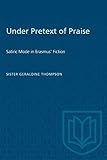Under Pretext of Praise : Satiric Mode in Erasmus' Fiction / Geraldine Thompson.
Material type: TextSeries: HeritagePublisher: Toronto : University of Toronto Press, [1973]Copyright date: ©1973Description: 1 online resource (216 p.)Content type:
TextSeries: HeritagePublisher: Toronto : University of Toronto Press, [1973]Copyright date: ©1973Description: 1 online resource (216 p.)Content type: - 9781487573522
- 9781487584191
- 878/.04/07
- PA8518 .T5 1973
- online - DeGruyter
| Item type | Current library | Call number | URL | Status | Notes | Barcode | |
|---|---|---|---|---|---|---|---|
 eBook
eBook
|
Biblioteca "Angelicum" Pont. Univ. S.Tommaso d'Aquino Nuvola online | online - DeGruyter (Browse shelf(Opens below)) | Online access | Not for loan (Accesso limitato) | Accesso per gli utenti autorizzati / Access for authorized users | (dgr)9781487584191 |
Browsing Biblioteca "Angelicum" Pont. Univ. S.Tommaso d'Aquino shelves, Shelving location: Nuvola online Close shelf browser (Hides shelf browser)

|

|

|

|

|

|

|
||
| online - DeGruyter Judicial Review of Legislation in Canada / | online - DeGruyter Regent Park : A Study in Slum Clearance / | online - DeGruyter Tune Thy Musicke to Thy Hart : The Art of Eloquent Singing in England 1597-1622 / | online - DeGruyter Under Pretext of Praise : Satiric Mode in Erasmus' Fiction / | online - DeGruyter The Crisis of the West : The Marfleet Lectures / | online - DeGruyter Graduate Education in the Sciences in Canadian Universities / | online - DeGruyter Some Aspects of Education in Denmark / |
restricted access online access with authorization star
http://purl.org/coar/access_right/c_16ec
The last decade has seen a renewal of interest in the works of Erasmus. Much has been written on the educational and editorial writings of that great humanist of the northern Renaissance, but relatively little on his fictional work. This book deals with the fiction of Erasmus and what it contains of instruction and delight. The attention of the study is focused primarily on the four satiric works: The Praise of Folly, the Colloquies, Julius secundus exclusus, and Ciceronianus, although the author, in the process analyzing and appraising, looked for analogues and explanations in the educational exegetical works. Three aspects of Erasmus' throught are considered. The first is his insistence on man's capacity for betterment through good teaching -- the formal teaching of a preceptor, or the incidental teaching of a good satirist or storyteller. The second is his notion of what man is and to what end he is to be educated. (Man is, of course, bent to knowledge and virtue, but one cannot afford to be too simple in one's appraisal of Erasmus' moral emphases -- the moral life involves both doer and spectator and is strongly dependent on the thinking process, althrough not divorced from the act of willing, and, activated by faith and the grade of God, is never far removed from creed and devotion.)The third aspect is Erasmus' special use of irony -- an irony both dramatic and satiric -- subtle and various, and doubly pronges so that it punctures what it praises but also questions the too obvious alternative, and leaves the reader pondering the whereabouts of the right and the perimeters of truth. To "e the atuhor: 'It seems to me that the fictional works are the exempla that give life and specificity to the great theories of a great man, and a study of them should not be without interest.'
Mode of access: Internet via World Wide Web.
In English.
Description based on online resource; title from PDF title page (publisher's Web site, viewed 01. Nov 2023)


